Red meat has developed a bad reputation over the years, with many health-conscious people limiting their intake of animal protein. Some have even removed meat from their diet entirely.
But the latest scientific evidence (paired with what we know from millions of years of evolution) suggests that avoiding meat — and especially red meat — is a misguided health strategy.
On an individual level, doing so can increase your risk factors for iron and Vitamin B12 deficiencies, inflammation, insulin resistance and other chronic diseases. And on a broader level, shifting away from animal-based diets will make our society even sicker and more nutrient-deprived than it already is.
Unfortunately, the nutritional world is plagued by dogma, misinformation and misleading scientific “evidence.” So in this article, I’ll dispel some of the most common myths peddled by both official dietary guidelines and plant-based eating activists, and share everything you need to know about how different types of meat positively or negatively impact your health.
Some of the most prominent of these myths include:
- The consumption of red meat causes cancer.
- White meat (such as chicken) is healthier than red meat.
- Saturated fats (from meat) clog your arteries.
- Plant-based or lab-grown meat is healthier than real meat.
You can jump directly to my myth-busting. But first, I recommend you read the sections below, which will help you understand the science behind why red meat is not the harmful substance it’s been made out to be.
Why Nutritional Science Can Be Misleading
As I explain in my article comparing the nutritional profile of plants vs. meat, nutritional science is incredibly complex and nuanced. That’s partly because we can’t do controlled studies involving thousands of people eating either only red meat or only broccoli (for example) over a long enough time period to identify how an individual food impacts health.
The best we can do is observe people, asking them what they’ve eaten over a certain period and then correlating those answers with their health outcomes. Unfortunately, such correlations are always influenced by confounding factors, like non-dietary lifestyle choices, which prevents us from establishing causation.
So whenever you hear someone say that “A is linked to B,” or that “A is correlated with B,” it’s important to understand that we don’t know if A caused B — we simply observed some degree of relationship between the two factors, and that relationship may or may not be relevant.
For example, in 2019 the American Heart Association announced that “excessive TV time is linked to heart risk in African Americans.” Of course, watching TV doesn’t cause heart disease. But chances are that people who watch TV for many hours every day also have confounding lifestyle factors that increase their risk of cardiovascular problems.
If these people stopped watching TV and sat in front of a computer instead — without changing anything else — their risk for heart disease would be exactly the same.
Evidence Humans Evolved to Thrive on Meat
Some people believe (or want to make you believe) that humans are plant eaters. The truth is that humans evolved to thrive on animal products while also having the ability to digest certain plant matter. I’d argue the latter is a survival or fall-back mechanism, but that’s for another discussion.
Here are just a handful of physiological adaptations that show us to be natural meat eaters:
- Eyes at the front of the head to fixate on prey. Most prey animals have their eyes on the side for a wider field of view.
- Low stomach PH (1.5-2.0) to break down and digest meat. According to a report summarized by Beasley et. al, that pH level is much lower than most animals, including anthropoids (≥ 3.0), and very close to that of carrion-eating animals called scavengers, such as falconine birds and vultures. This report shows a trend that pH in the stomach is the highest in herbivores and decreases in order of carnivores, omnivores, and scavengers. The pH of humans is lower among omnivores and equal to scavengers.
- Short large intestine and long small intestines, mimicking the intestines of carnivores rather than herbivores who have long large intestines and, sometimes, multiple stomachs to efficiently extract nutrients from plant matter.
- Tooth structure. Incisors and canines for tearing, plus molars that can grind. While not as specialized for raw-meat tearing as a lion’s teeth (for example), our dentition works well for a mixed but notably carnivorous diet (especially when aided by cooking or tool use).
- Vertical chewing: Humans chew primarily in an up-and-down (vertical) motion, using molars for crushing and canines and incisors for tearing. This motion is well-suited for consuming meat, as it allows efficient biting, tearing, and crushing of animal tissues, including muscle and fat. If humans were primarily herbivores, we would have developed lateral jaw movement and specialized teeth to grind fibrous plant matter, as is the case with ruminant animals.
Humans are well-adapted to animal foods not only because of our stomach acidity, tooth structure and digestive system, but also due to our historical reliance on hunting and fishing for securing high-quality, nutrient-dense foods. Animal foods offer complete protein profiles and essential nutrients such as heme-iron, Vitamin B12 and zinc — nutrients that are significantly less bioavailable from plant sources.
Certain traditional populations, such as the Inuit, thrived for generations on diets composed almost entirely of animal foods with little to no plant matter, demonstrating that humans do not require plants to survive. While modern diets have changed, these examples highlight that plant consumption is not obligatory for optimal health.
While humans have physiological adaptations that make animal foods the superior source of nutrition, we also developed cultural and technological adaptations to process plant foods to make them more digestible. Cooking, fermentation and sprouting help neutralize anti-nutrients such as phytates, which interfere with mineral absorption. However, this doesn’t mean plants are necessary — it simply means humans have historically adapted ways to extract nutrition from them when needed.
Notably, some human populations have genetic adaptations that enhance carbohydrate digestion, such as increased copies of the AMY1 gene, which aids in starch breakdown. However, this adaptation varies across populations, reinforcing the idea that plants have always played a supplementary rather than a central role in the human diet.
Key Health Benefits of Consuming Red Meat
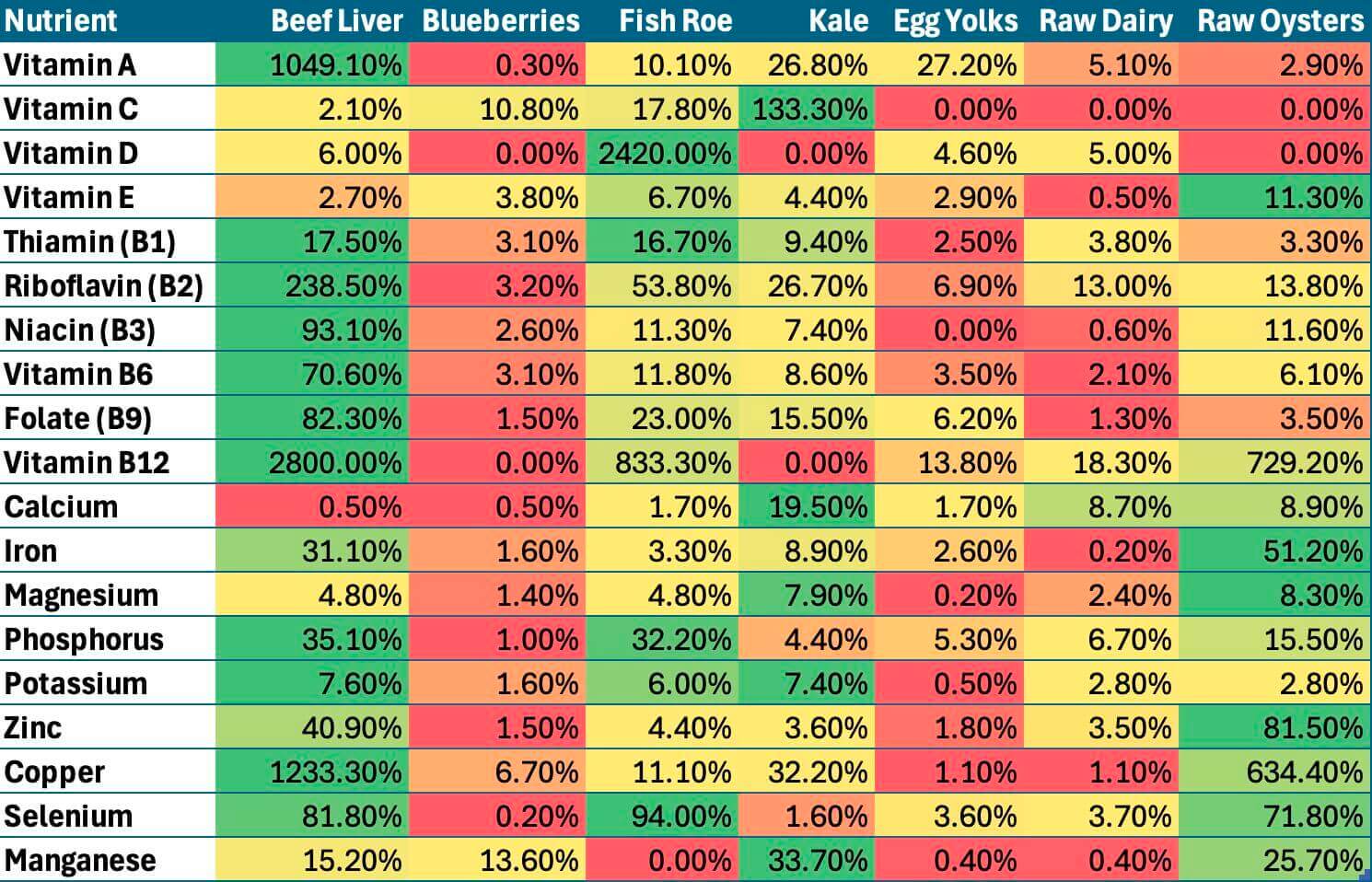
Not only does red meat not cause harm, consuming high-quality red meat has been scientifically proven to come with a host of benefits.
- It’s an excellent source of essential and non-essential amino acids (the building blocks of protein), some of which you can’t get from plant-based food.
- It has no carbohydrates and thus little to no impact on your blood sugar levels.
- It’s an excellent source of highly bioavailable vitamins and minerals, including several B vitamins, copper, heme-iron, magnesium, potassium, phosphorus, selenium, Vitamin E, zinc and more.
- It’s a great source of healthy, saturated fats that won’t clog your arteries.
- It has Vitamin K2 (MK-4) — the most bioavailable form of Vitamin K — to support bone and dental health.
- It’s rich in creatine, which plays an important part in muscle and brain function.
- Organ meats, such as liver, have the highest concentrations of micronutrients (vitamins and minerals) per pound, making them nature’s ultimate superfood.
To learn more about the benefits of consuming a meat-based diet, check out this article about why I stopped consuming almost all vegetables.
Myths About Why Red Meat Is Bad for Your Health
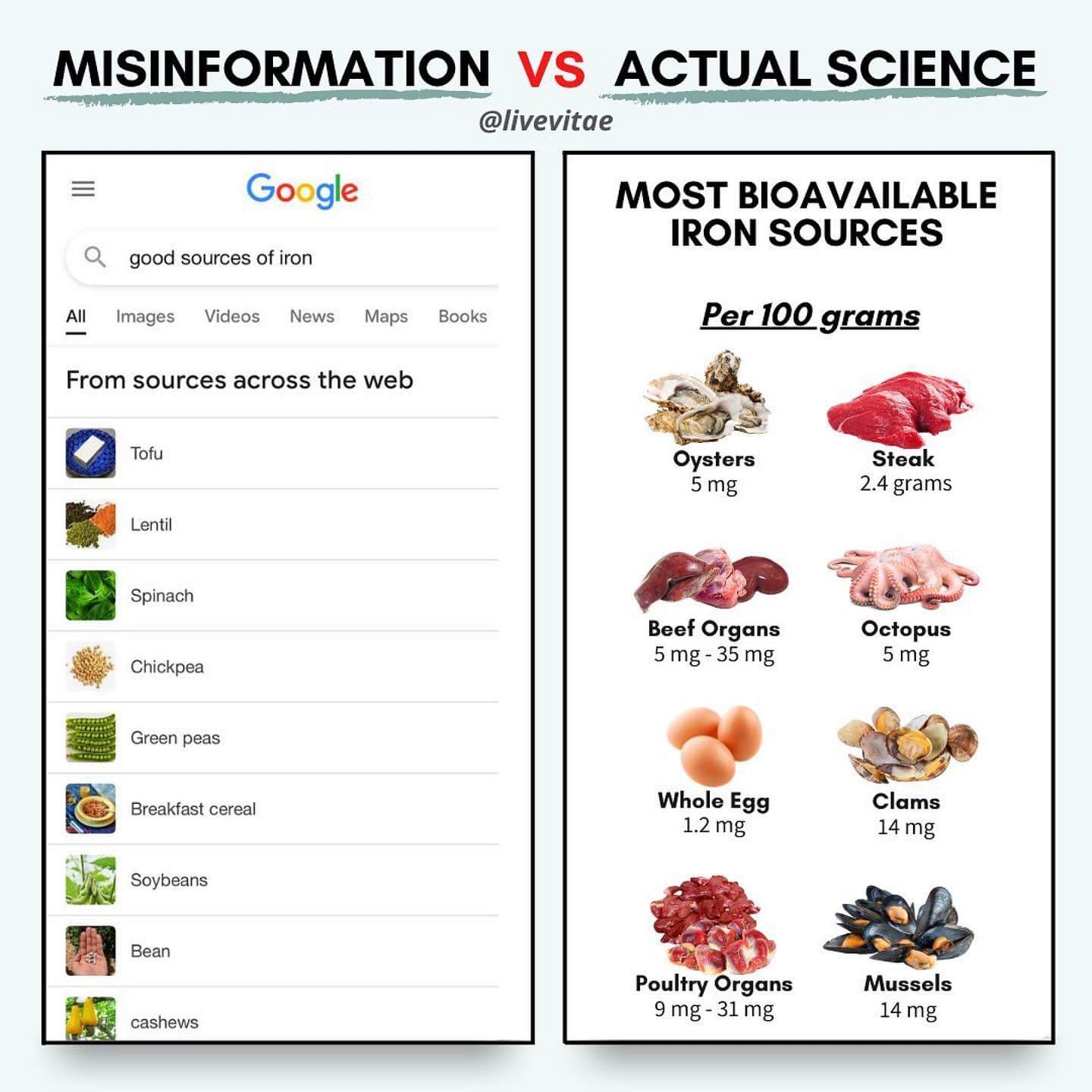
Before I dig into some of the most common myths surrounding red meat consumption, it’s important to clarify some terminology.
- What is red meat? Red meat includes beef, veal, buffalo, bison, venison, pork, lamb, mutton, horse and goat. Technically, it also includes dog, cat and any other mammalian muscle meat — but those are usually not part of people’s diets. It does not include “white meat” from poultry or seafood.
- What is processed meat? The term “processed meat” refers to meat that has been transformed through salting, curing, fermentation, smoking or other processes, which enhance its flavor and/or make it easier to preserve. Most processed meats contain pork or beef, but processed meats may also contain other red meats, poultry, offal (organs) or meat by-products (such as blood). Examples of some processed meat include hot dogs, ham, sausages (like salami), corned beef and beef jerky, as well as canned meat and meat-based preparations and sauces.
With that out of the way, let’s bust some myths. As part of my research for this article, I wanted to better understand why some people try to avoid consuming meat. So I searched for the term “top reasons why meat is unhealthy,” and what I found was shocking.
Myth #1: Red Meat Negatively Impacts Your Overall Health Markers
Many people believe that the more red meat they consume, the more likely they are to die from any of the diseases supposedly associated with red meat consumption, including cancer, diabetes, stroke and heart disease.
This myth likely stems from poorly designed studies, such as this 2023 study (published in the American Journal of Clinical Nutrition) in which the authors concluded that red meat consumption can increase the risk of developing Type 2 diabetes.
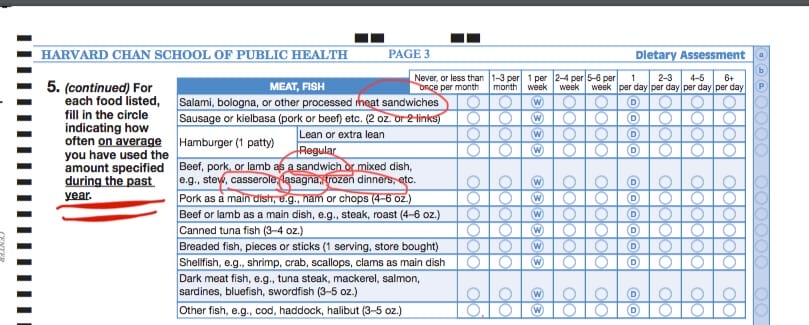
One of the many problems with this study is the fact that its definition of red meat included foods such as “meat sandwiches,” casseroles, lasagna and frozen dinners – all sources of glucose-spiking carbohydrates.
What’s more, the study was based entirely on a questionnaire (see image above) that asked participants about their average food consumption over the past year. I don’t know about you, but I don’t recall what I ate a month ago, let alone a year ago.
However, based on a cross-sectional data analysis of 175 contemporary populations, scientists confirmed that red meat intake is positively correlated with life expectancy, concluding that, “in contrast, carbohydrate crops showed weak and negative correlation with life expectancy.”
Another study, published in 2021 by Harvard University, looked at 2,029 participants who followed a carnivore diet for over 6 months and concluded that:
- 100% of diabetics came off injectable medications.
- 92% of diabetics came off insulin completely.
- 84% of diabetics came off all oral medications.
- There was a 90% improvement in all diseases.
- The average weight loss across all participants was 20%.
- 84% saw relief from digestive issues, including IBS and bloating.
- 96% reported improved mental clarity and focus.
- 85% had more stable energy levels.
This study provided strong evidence that a carnivore diet can improve metabolic health, mental well-being, digestive issues, and autoimmune conditions — without any of the expected negative effects on cardiovascular health (as measured by blood lipids, which likely would have been evident within that six-month time period).
Additionally, if you look at certain populations who live longer-than-average lives and who also consume a lot of meat, but who do not make the same poor lifestyle choices as Americans, you can surmise that eating meat doesn’t shorten your lifespan.
For example, people from Hong Kong consume 1.5 pounds (695 grams) of meat per day (more than any other nation) and they have a life expectancy of 84.3 years — the world’s highest.
So no: eating meat does not shorten your life or increase your risk of death. Instead, seed oils, sugar and refined carbohydrates do that, by causing chronic inflammation and metabolic dysfunction (as we will discuss throughout this article).
Myth #2: Red Meat Increases Your Risk of Cancer
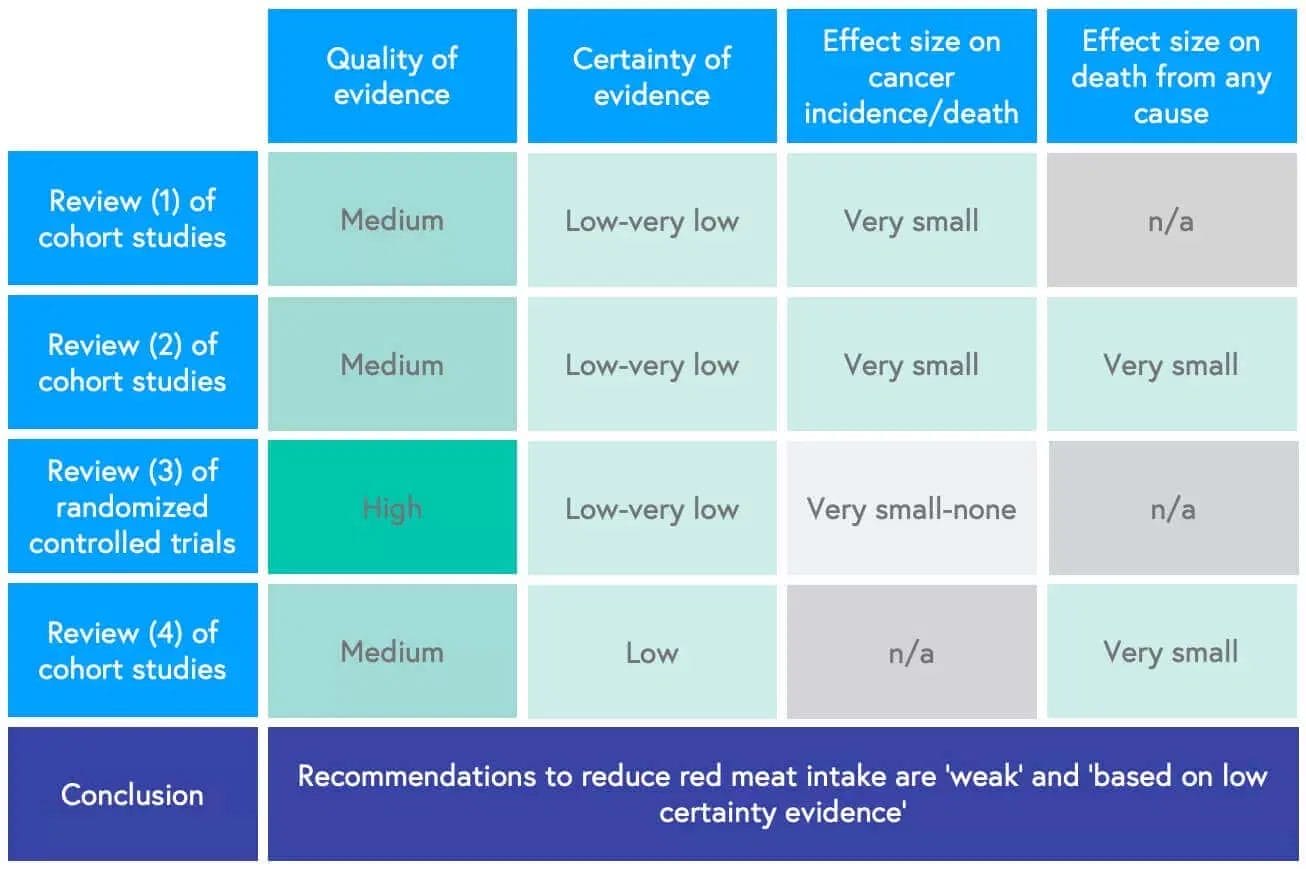
After the World Health Organization (WHO) announced in 2015 that consuming red and processed meats could increase the risk of developing certain types of cancer, many people got concerned and started reducing their red meat intake. Honestly, I was one of them after my wife pointed out how much red meat I consumed.
The study conducted by the International Agency for Research on Cancer (IARC, which is part of the WHO) was a meta-analysis (a systematic review) of several existing studies that had correlated the consumption of red meat with an increased risk of developing colorectal cancer, pancreatic cancer and prostate cancer.
After reading the study, my first question was this: how can red meat — a food that humans have thrived on for millions of years and that made us the dominant species on the planet — be bad for us and cause cancer? It doesn’t make any sense when you think about it in those terms.
The problem is that studies such as the one published by the WHO rely on weak, observational evidence and results from animal studies and test tubes. For example, just because a compound found in meat is (probably) carcinogenic in a test tube doesn’t mean it also causes cancer in the human body.
I consider drawing such oversimplified conclusions a form of reductionist thinking that doesn’t appreciate the fact that human metabolism is complex and that meat has hundreds of chemical compounds that can influence how the body metabolizes and neutralizes carcinogens.
But aside from the fact that recommending a limited intake of red meat is incongruent with our evolutionary background, several studies have since been published that show red meat does not increase your cancer risk.
For example, a systematic review of randomized trials on the effect of lower versus higher red meat intake on cardiometabolic and cancer outcomes concluded that, “low- to very-low-certainty evidence suggests that diets restricted in red meat may have little or no effect on major cardiometabolic outcomes and cancer mortality and incidence.”
In other words, reducing meat intake appears to have no impact on cardiovascular or cancer risk.
Another study, published in the Annals of Internal Medicine, concluded that adults should not change their unprocessed or processed meat intake because the evidence provided by previous studies (which suggested reducing meat intake) was weak (low-certainty evidence).
Myth #3: Red Meat Increases Your Risk of Heart Disease and Stroke
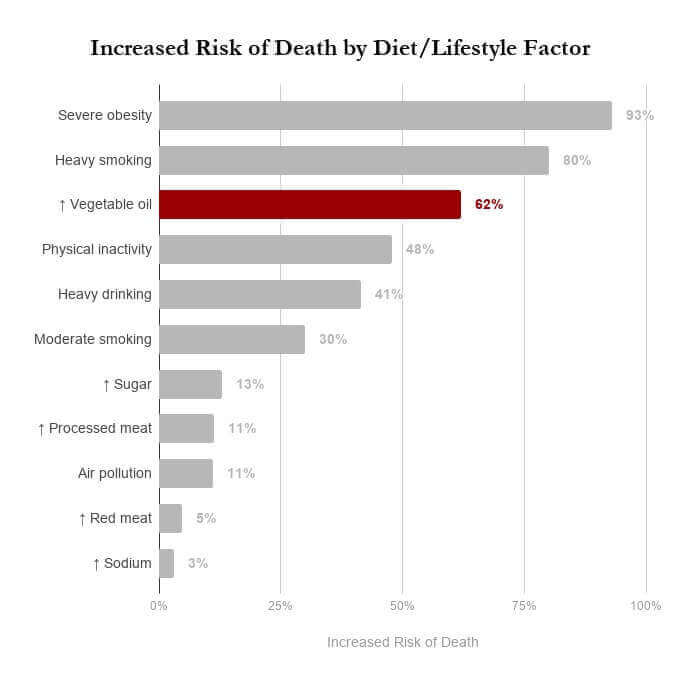
Consuming red meat supposedly increases your risk of developing cardiovascular disease because its cholesterol and saturated fats clog your arteries.
I can’t believe this myth has stuck around since the 1960s, when Ancel Keys released his highly-flawed and now-debunked “Seven Countries Study.”
Let me be clear: Saturated fats and dietary cholesterol are good for you, and they don’t increase the risk of developing heart disease. That’s been demonstrated by several studies, including this one published in the British Journal of Sports Medicine, which concluded that, “saturated fat does not clog the arteries: coronary heart disease is a chronic inflammatory condition, the risk of which can be effectively reduced from healthy lifestyle interventions.”
What does cause chronic disease is the consumption of industrial seed oil (i.e. vegetable oils), because they contain high amounts of volatile and inflammatory polyunsaturated fatty acids (and omega-6 in particular).
For example the “Sydney-Diet Heart Study,” which was published in the peer-reviewed medical trade journal BMJ, concluded that replacing saturated fats with polyunsaturated fats (PUFAS) from seed oils (specifically, linoleic acid) increased death rates from all causes, coronary heart disease, and cardiovascular disease.
Another study concluded that when unsaturated fatty acid oxidizes, it leads to the creation of inflammatory compounds and, in turn, can lead to tissue damage, arteriosclerosis (the buildup of plaque inside artery walls), the accumulation of adipose (fat) tissue and a host of chronic diseases including cardiovascular disease, Type 2 diabetes, obesity and more.
To learn more, I recommend reading my blog post about the negative health implications of saturated, monounsaturated and polyunsaturated fats.
Myth #4: Red Meat Increases Your Risk of Diabetes
A study from 2018, conducted by the American Diabetes Association, found an association between consuming meat that was cooked at high temperatures and an increased risk of Type 2 diabetes. The researchers concluded that heterocyclic aromatic amines — chemicals that form when meat is cooked at high temperatures or over an open flame — are the culprit.
But this is another example of an epidemiologic (observational) study that shows correlation but doesn’t prove causation.
The hypothesis that consuming meat cooked at high temperatures or over an open flame causes diabetes is evolutionarily inconsistent. But we don’t have to look back in human history to conclude that this finding is baloney. Modern hunter-gatherer tribes, such as the Hadza in Tanzania, cook all of their meat over an open flame and few if any of them suffer from Type 2 diabetes (nor do any of my carnivorous friends).
I’ve been consuming a diet consisting of predominantly animal protein prepared at high temperatures for over five years, and my blood markers — including my fasting insulin, hemoglobin A1C, CRP and others — show zero signs of insulin resistance.
However, I admit that the Hadza and I (myself to an arguably lesser degree), maintain a healthy lifestyle that supports the body’s natural defense and antioxidant mechanisms. It’s conceivable that certain carcinogenic compounds (created by preparing meat over an open flame) are more harmful to someone who isn’t metabolically as healthy as the Hadza.
The obvious solution to mitigate this risk is to adopt a healthy lifestyle.
Myth #5: Red Meat Makes It Harder to Maintain a Healthy Body Weight

This myth is based on observational studies comparing meat-eaters to people who follow a plant-based or vegan diet.
The problem is that the average American meat-eater doesn’t follow a carnivore, paleo or ketogenic diet. Instead, most consume some variation of the standard American diet, which includes unhealthy meat products like fast food burgers and processed meat snacks.
Based on everything I’ve learned about nutrition over the past decade, it appears as if the widespread consumption of polyunsaturated fatty acids — such as linoleic acid, from industrial seed oils that are prevalent in the American diet, like canola, safflower and soybean — is the primary driver for the metabolic dysfunction that causes people to become less sensitive or resistant to certain hormones (e.g., leptin or insulin). It can also disturb cellular nutrient sensing (the inability of the cells to efficiently use nutrients for fuel) and lead to overeating and obesity.
More importantly, over 36% of Americans consume fast food daily. Plus, the average American consumes 152 pounds of sugar and 85 pounds of industrial seed (vegetable) oils per year. So that’s where the problem stems from, not the meat those people eat.
My diet predominantly consists of animal protein in the form of red meat, and let me assure you that I don’t have any issues maintaining my weight. That’s not surprising, since many meats can actually support weight loss.
Funnily enough, my body mass index (BMI) of 27.8 would suggest that I’m overweight, despite my relatively low body fat percentage of 8-11%.
Myth #6: Red Meat Carries the Highest Risk of Food-Borne Illness

Carnivorous and meat-leaning animals, including humans, have a relatively acidic stomach, which can kill most pathogens that food may be contaminated with. Problems arise when ruminant animals (which are uniquely designed to digest grasses) are fed an unnatural diet consisting of grains, corn and soy.
This unnatural and species-inappropriate diet allows certain strains of harmful bacteria (e.g., E. coli O157:H7) to mutate and become resistant to stomach acid. In other words, if we ingest meat tainted with acid-resistant pathogens, we can get seriously sick.
The solution to this problem is relatively simple: avoid meat that comes from from irresponsibly-raised animals and stick to grass-fed and grass-finished meat instead.
But here is the kicker: despite that risk, it’s actually vegetables and leafy greens that are the most common source of food poisoning.
I highly recommend against consuming raw leafy greens — not necessarily because of the salmonella risk, but due to the natural defense toxins found in those plants. If you must make greens part of your diet, cooking them can both destroy potential pathogens and reduce their load of “natural” toxins.
The bottom line is that high-quality meat from 100% pasture-raised or wild-caught animals, sold by farms that have implemented regenerative farming practices, has never been a major source of food-borne illnesses.
That’s why I’m confident enough to consume most of the meat we purchase raw (I like my steaks and patties browned on the outside but raw on the inside).
Myth #7: Red Meat Contributes to Erectile Dysfunction
Some observational studies have linked the consumption of red meat with high blood pressure and reduced blood flow — both of which can be contributing factors to erectile dysfunction (ED).
However, as we discussed earlier in this article, consuming red meat doesn’t clog your arteries and thus does not reduce blood flow. So while reduced blood flow can lead to ED, it’s not caused by the consumption of meat.
Similarly, high blood pressure can keep the arteries that carry blood into the penis from dilating and from making it erect. The hypothesis is that a particular amino acid found in meat (carnitine) gets metabolized by certain bacteria in the gut to trimethylamine (TMA), which is then converted to trimethylamine-n-oxide (TMAO). TMAO is believed to cause a temporary increase in blood pressure.
While that might be mechanistically true, claiming that red meat causes chronic high blood pressure in healthy individuals is completely inconsistent from an evolutionary perspective and it doesn’t appear to affect many populations who still consume a lot of meat, including people from Hong Kong, Japan, the Inuits or modern hunter-gatherer tribes like the Hadza.
Additionally, the 2021 Harvard study I mentioned early found that following a carnivore diet for six months had no negative impact on blood pressure.
As a result, I conclude that high blood pressure is likely caused by poor lifestyle choices and bad dietary habits, including the consumption of junk food.
Myth #8: Red Meat Can Make You Resistant to Antibiotics
Based on a study from 2012, the use of antibiotics in food animals is widespread. The study concluded that, “agricultural use of antibiotics [should] be recognized as one of the major contributors to the development of resistant organisms that result in life-threatening human infections.”
It’s important to note that while a substantial percentage of beef cattle in the U.S. are treated with antibiotics, regulations are in place to ensure that antibiotic residues do not remain in the meat by the time it reaches consumers. The U.S. Department of Agriculture (USDA) monitors meat products, and in 2018, less than 0.5% of all meat samples tested contained detectable antibiotic residues.
However, you have choices when it comes to the type of meat you purchase. As with many other foods, you get what you pay for. Opting for the lowest-quality meat you can find at Walmart, or fulfilling your daily meat requirements via a trip to McDonald’s or Chick-fil-A, will likely lead to health issues in the long run.
However, if you purchase meat from brands that don’t use antibiotics for their livestock, there is no issue.
Putting the Scientific “Evidence” Against Meat to Rest
Throughout this article, I’ve outlined the problems associated with observational studies. But I wanted to make another important point.
When scientists recruit participants to study the impact of meat on health markers, do you think the majority of these volunteers are people who follow a carnivore, keto or paleo diet, exercise regularly, protect their sleep and effectively manage their stress?
Probably not. Instead, most study participants likely follow the standard American diet that consists of processed foods, highly-inflammatory seed oils and other junk food.
On the flip side, many people who follow a plant-based diet are likely more conscious of their diet, exercise regularly, meditate and do other things to support their well-being.
So it shouldn’t come as a surprise that someone who gets their daily serving of meat from burgers, highly-processed sausages, sauces (like classic bolognese sauce) and chicken wings fried in vegetable oils will have an increased risk of developing a chronic disease.
But that’s not the meat’s fault — it’s the foods that come with it, along with the other poor lifestyle choices.
Plant-Based Meat Isn’t Healthier Than Meat
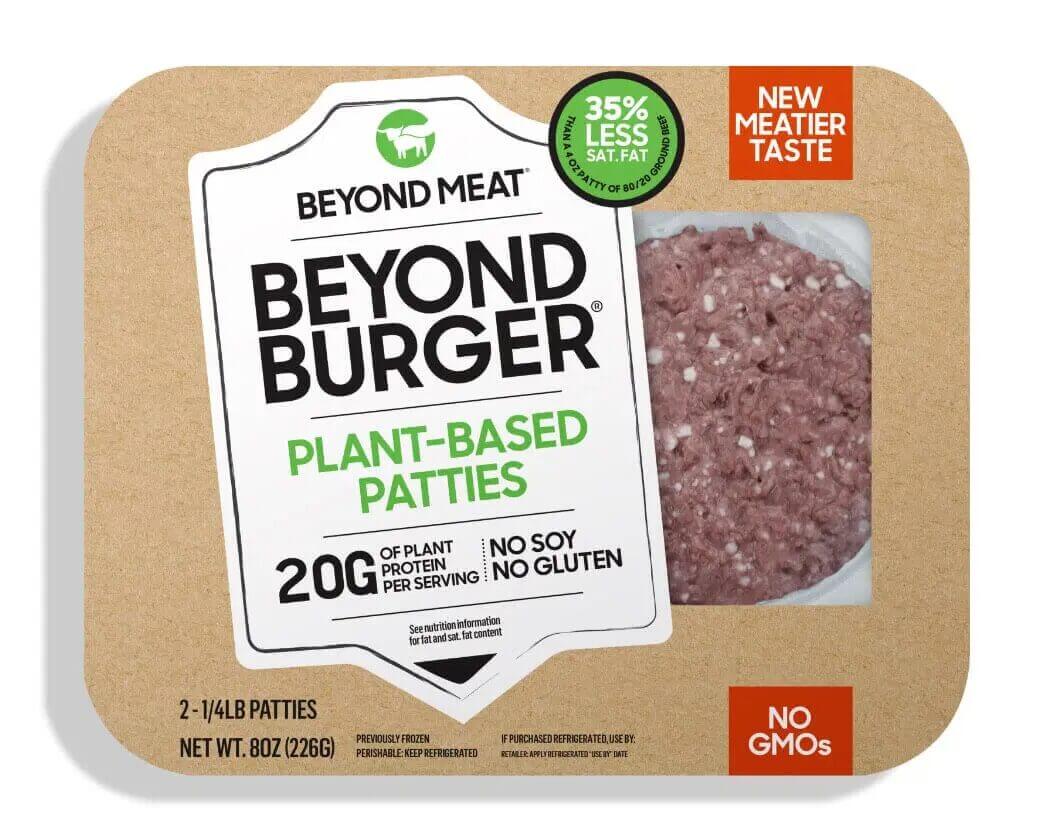
Fake meat brands are pouring millions of dollars into advertising, trying to convince consumers that their meat-like products are better for your health and the environment than the real deal.
They’re not.
Just look at the Beyond Burger ingredient list, a popular fake meat product sold at many grocery stores (including Whole Foods). Besides water, the main ingredients are pea protein and canola oil. The former is a source of poorly absorbed protein and the latter is one of the most inflammatory oils on the market.
To make this garbage somewhat nutritional, Beyond Burger also includes a variety of synthetic vitamins and minerals that you would naturally find in meat in much more bioavailable forms.
Fake meat products like Beyond Burger are not only less nutrient-dense than real meat, they’re downright inflammatory. Additionally, the growing, shipping and manufacturing of the numerous ingredients is certainly not better for the planet than raising cattle on pasture.
The bottom line is that unlike real meat, which provides a natural, bioavailable source of essential amino acids, plant-based meat substitutes require heavy processing to mimic the nutritional profile of animal foods. Even with fortification, the vitamins and minerals in fake meat are often in forms that are poorly absorbed by the body compared to their counterparts in red meat.
Additionally, proponents of plant-based diets argue that fiber, phytochemicals and certain plant-derived nutrients are necessary for health. While some plant compounds can offer benefits, they are often tied up with anti-nutrients that reduce their bioavailability. For those who rely on plants for sustenance, proper preparation techniques such as fermentation and sprouting are critical for making these foods safer and more digestible.
Frequently Asked Questions
No, I don’t think that’s the case. In fact, I limit my intake of white meat because white meat, especially that from poultry, is naturally higher in omega-6 fatty acids due to cross-breeding and the feed used by poultry farmers. For example, most chickens in the United States are given soy-based and corn-based feed that’s also high in omega-6.
Unfortunately, the high concentrations of these polyunsaturated fatty acids (PUFAS) in animal feed end up in the meat. That’s one of the reasons why we give the chickens on the Kummer Homestead only organic supplemental feed that is free of both corn and soy.
I should also mention that meat from corn-fed cows has higher concentrations of omega-6 than that of grass-fed cows. That’s one of the reasons why I recommend buying 100% pasture-raised beef, if possible.
For a deeper dive, read my article on beef vs. chicken, which offers a full nutrient breakdown and comparison.
Yes, beef is generally better for you than pork because cows and other ruminant animals do a better job at converting what they eat into healthy fats. Pigs and other monogastric animals are often fed a corn and soy-based diet that increases the omega-6 concentration in their fat tissue. Additionally, stored feed is often contaminated with mold, such as Ochratoxin A (a “storage fungi”) that ends up in the meat you consume.
If you like pork, I recommend sticking with pasture-raised options only.
Raising livestock on pasture is not only better for the animals and the environment, but also produces meat with a better nutrient profile and an improved omega-3 to omega-6 ratio.
Raising livestock using regenerative farming practices is actually good for the environment because it sequesters more carbon than it produces. A great example of a farm that practices regenerative agriculture is White Oak Pastures here in Georgia.
Of course, raising cattle on feedlots and with an unnatural diet of corn and soy is neither good for the animal nor the environment. That’s why I strongly recommend purchasing only 100% pasture-raised meat, if possible.
Despite what you might have heard, cutting meat from your diet isn’t a great cancer prevention strategy. That’s because there is no strong evidence that eating red meat increases your colon cancer risk.
Preparing meat over an open flame or high heat does support the creation of certain carcinogenic compounds, including heterocyclic amines (HCAs) and polycyclic aromatic hydrocarbons (PAHs). But considering the fact that our ancestors cooked meat over open flames — and that contemporary hunter-gatherer societies still do so — I’m not too concerned about the risk.
However, I should also mention that I usually grill my steak only until the outside is lightly browned, while the inside is still raw. In other words, I don’t leave my steak on the grill until it’s well-done.
Based on everything I’ve learned about the different curing methods, I don’t think “uncured” bacon is any healthier than cured bacon.
What’s important to understand is that curing bacon requires the use of nitrates. There is no way around that. However, many products labeled as “uncured” — such as the bacon I regularly buy at Whole Foods — are indeed cured.
That’s because the label “uncured” refers to the absence of nitrates other than the ones naturally occurring in celery juice powder. In other words, both curing methods use nitrates and manufacturers shouldn’t be allowed to use the term “uncured.”
The bottom line is that there is no reliable scientific evidence that nitrates are carcinogenic. But if they are, the ones found in celery juice might not be any better than those found in curing salts.
Most bacon you can find in the store is unhealthy because it’s highly processed and made from grain-fed pigs.
Some of the issues associated with bacon are nitrates (see above), N-nitroso compounds (i.e., nitrosamines and nitrosamides), ochratoxin A (a mold toxin and storage fungi).
Studies have shown that pigs that were fed corn oil had significantly higher levels of nitrosamines in their meat. As a result, I recommend consuming only bacon made from pastured pigs.
Ochratoxin A is a storage fungus that grows in grain storage silos. When pigs consume contaminated feed (usually corn or soy), the fungi transfer to the meat. That’s another reason to stick with bacon made from pasture-raised pigs.
If you really want to get the healthiest bacon possible, you probably have to cure it yourself using a combination of curing salts, powdered versions of ascorbic acid (Vitamin C) and alpha-tocopherol (Vitamin E). The latter two are antioxidants that can protect the meat and prevent the formation of nitrosamines.
Consuming Meat Is Important for Your Health

The nutritional world is full of dogma and misinformation, and it seems like new studies come out daily that provide conflicting information about what foods are good and bad for us.
While the scientific method is one of the few tools we have for figuring out how stuff works, it’s important to pay attention to context and nuance. One of the quickest ways to judge whether or not the results of a study make sense is to check if they’re consistent with what we know about human evolution.
At the heart of human dietary evolution is adaptability. Pre-agricultural humans likely preferred animal foods due to their superior nutrient density, while plant foods served as a fallback in times of scarcity. This does not make humans “herbivores” or even “equal omnivores” in the way some claim — it simply underscores the physiological flexibility that allowed our species to thrive across diverse environments.
By that standard, consuming meat from pasture-raised and wild-caught animals, like our ancestors and early humans did for millions of years, can’t possibly be detrimental to our health.
In fact, based on everything I know about nutrition and how the body works, meat and organ meats should be the center of the human diet to achieve and maintain optimal health. That’s what I’ve been doing for the past few years and I’m fitter, stronger and healthier than I’ve ever been.

Michael Kummer is a healthy living enthusiast and CrossFit athlete whose goal is to help people achieve optimal health by bridging the gap between ancestral living and the demands of modern society.



What is cholesterol used for in the body? Making hormones, those messengers that communicate from the body to the brain. Specifically, gonadotropins, which are necessary to improve one’s masculinity or femininity (gender-based). What is your take on farm-fed chickens and their eggs?
Hey Patrick,
it seems like you answered your first question yourself. Not sure what you mean by “farm-fed.” All chickens are raised on farms but that doesn’t say anything about their living conditions or feed they are fed.
Cheers,
Michael
Great job on putting this together Michael. It is hard for a normal, skeptical science interested person to keep the head above the mist when it comes to the plants vs animal dogma. There are som much plant dogma all based on so really really weak evidence that when one point that out, one sounds like a conspiracy theorist. How could so many intelligent people think weak is strong? How can so many meta research papers be wrong? Well, weak shit in is weak shit out even if you put hundreds weak shits together. Its like watching the finance crisis all over again when the finance creatives took high risk piles of liabilities and put them together to form a new more credible low risk investment. A lot of shit in was turned into something it was not. Nutrition research papers copy this and voila, we have the emperors new clothes. Weak or no correlation is suddenly high and possible casuality. Darn amazing, if it wasn’t sad.
Thanks for the kind words! You’ve hit the nail on the head. It can definitely feel like navigating a fog of confusion when it comes to the plant vs. animal debate. The plant-based narrative is often supported by epidemiological studies that rely on weak correlations, and as you mentioned, stacking weak evidence together doesn’t make it stronger—just like bundling risky financial assets doesn’t magically create a safe investment.
The problem is that much of nutrition research is based on observational studies, which can only show associations, not cause and effect. When these associations get blown out of proportion, it creates a lot of misinformation. It’s frustrating because when you point out the flaws, it can sound like you’re challenging mainstream science, but the truth is, real science is about questioning weak evidence, not accepting it blindly.
At the end of the day, it’s about using common sense, looking at the evolutionary framework, and testing what works best for our own health. Hopefully, more people will start to dig deeper into the quality of the evidence rather than just following the dominant narrative. Appreciate you sharing your thoughts!
Great article although I found one study does not exist anymore. It is a pity but it was probably deleted because it goes against the actual plant-based vegan propaganda.
Thanks! Do you remember what link wasn’t working? I tried to find it but couldn’t.
This article is completely false. Meat, in general, containes a large amount of fat, cholesterol, and animal protein that is extremely harmful to one’s health. LDL cholesterol is found on meat, (especially red meat ) and contributes to plaque formation in the arteries which can lead to corneal heart disease and heart attacks. a vegetarian or vegan lifestyle is the best for one’s health.
Hi Johannes,
have you actually taken the time to read the article and verify the scientific sources I linked to? I feel like you just keep repeating the myths I addressed head-on in my article.
Cheers,
Michael
I bet you truly believe all that too… sad.
Great article thank you Michael…. now the link between Alzheimer’s and red meat???
Alzheimers is now being called type 3 diabetes. Diabetes is driven by high blood sugar, by high insulin, by carbs. And we heal it by a very low carb, high fat diet, many people have done so already. The brain loves fat and is 60% fat. Lots of great info about this on YouTube, and its easy to find. Alzheimers is not a mystery to us anymore. But many people will still succumb to it due to their fear of eating fat. Seen the movie Fat Fiction? Its a great place to start, by Dr and ND Mark Hyman.